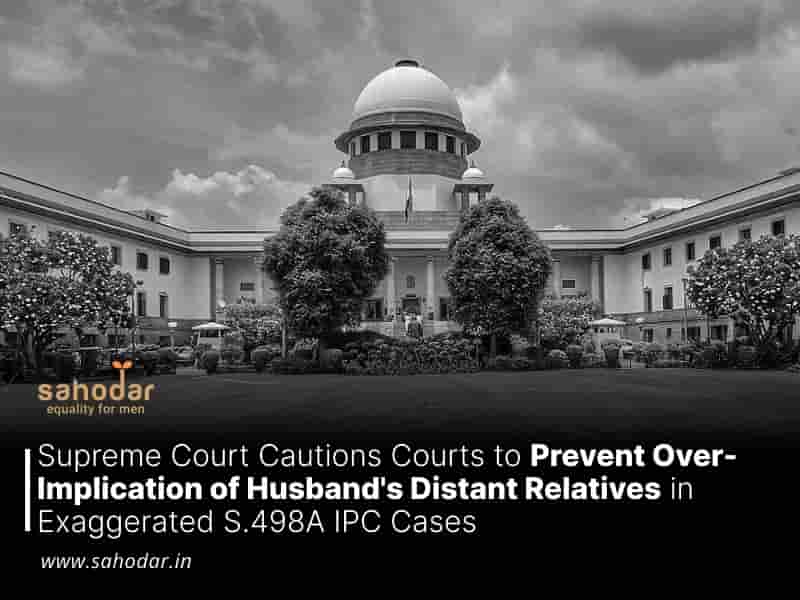The Supreme Court has issued a caution to the lower courts, urging them to prevent the unnecessary implication of a husband’s distant relatives in criminal cases filed by a wife alleging domestic cruelty under Section 498A of the Indian Penal Code.
This remark was made by a bench consisting of Justice CT Ravikumar and Justice Rajesh Bindal while quashing the criminal proceedings against the husband’s cousin and his wife, who were named as accused in the FIR filed by the wife’s father.
he petitioners approached the Supreme Court after the Punjab and Haryana High Court declined to quash the case against them. Criticizing the High Court’s approach, the Supreme Court remarked that the High Court was obligated to assess whether the involvement of the husband’s distant relatives constituted an “over-implication” and an “exaggerated version.”
In this context, the bench quoted the observations made in Preeti Gupta & Anr. v. State of Jharkhand & Anr (2010) 7 SCC 667 that “The criminal trials lead to immense sufferings for all concerned. Even ultimate acquittal in the trial may also not be able to wipe out the deep scars of sufferings of ignominy.”
The Court said that the above observation was in fact “a caution, against non-discharge of the duty to see whether implication of a person who is not a close relative of the family of the husband is over implication or whether allegation against any such person is an exaggerated version, in matrimonial disputes of this nature.”
The Court observed that the term “relative” is not defined in the statute and must therefore be interpreted in its commonly understood sense. Consequently, it can generally be understood to include an individual’s father, mother, husband or wife, son, daughter, brother, sister, nephew, niece, grandson, or granddaughter, as well as the spouse of any person. In other words, a relative is someone connected by blood, marriage, or adoption.
When the accusations are made against someone who is not related by blood, marriage, or adoption, the courts have an obligation to assess whether the allegations are exaggerated.
“In such circumstances, normally against a person who is not falling under any of the aforesaid categories when allegations are raised, in the light of the observations made in Preeti Gupta’s case (supra), the Court concerned owes an irrecusable duty to see whether such implication is over implication and/or whether the allegations against such a person is an exaggerated version,” stated the judgment authored by Justice Ravikumar.
The Court also referred to the judgment in Geeta Mehrotra and Anr. v. State of U.P. and Anr (2012) 10 SCC 741, which held that a mere casual mention of family members’ names in a matrimonial dispute, without allegations of their active involvement, does not warrant taking cognizance against them. The judgment cautioned against the tendency of over-implication, where entire household members are dragged into the domestic quarrel, especially when the dispute arises shortly after the marriage.
Taking into account the fact that the petitioners were residing in a different city (Mohali) from the complainant’s daughter (Jalandhar), the Court further observed:
“In matters like the one at hand when relatives not residing in the same house where the alleged victim resides, the courts shall not stop consideration by merely looking into the question where the accused is a person falling within the ambit of the expression ‘relative’ for the purpose of Section 498-A, IPC, but should also consider whether it is a case of over implication or exaggerated version solely to implicate such person(s) to pressurise the main accused.”
The Court observed that the allegations were “general and sweeping” in nature, and there was no prima facie evidence to establish that the offences were made out.
The bench remarked, “It is clear that subjecting them to trial based on the aforementioned allegations would amount to an abuse of the court’s process.”
The FIR was filed shortly after the husband initiated divorce proceedings against the wife. In addition to the husband and his parents, the complainant (the wife’s father) also made allegations of dowry harassment and cruelty against the husband’s cousin and his wife. The High Court refused to intervene, noting that the final report had been filed.
The Supreme Court remarked that the filing of the final report cannot be the sole reason to deny interference.
“It is clear that subjecting them to trial based on the aforementioned allegations would amount to an abuse of the court’s process,” the Court stated.

